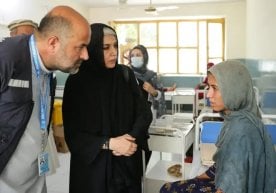Chinese scientists' formula to stop aging: now you can live to 150 years

The New York Times reported that Lonvi Biosciences laboratory, located in Shenzhen, China, is conducting new scientific trials in the field of longevity worldwide. This laboratory began to gain recognition as a startup specializing in slowing down the aging process and extending human life.
Laboratory specialists have created anti-aging tablets based on a substance called procianidine C1 (PCC1) obtained from grape seeds. This substance slowed down the activity of aging cells in the body, increased life expectancy by 9.4% in experiments conducted on mice, and extended overall life expectancy by 64.2% after treatment began.
According to Liu Xinghua, Chief Technical Officer of Lonvi Biosciences, "in the future, it is scientifically possible for a person to live to 150 years, which is no longer a myth, but a real prospect." In his opinion, longevity becomes natural by controlling the process of cell renewal in the human body.
Grape seeds have long been used as a healthy product in Western countries as well. Its oil is used in cosmetology to rejuvenate the skin and restore cells. However, in China, business in this direction was previously perceived as fraud, but now the situation has changed dramatically - state support and private investments have transformed this industry into a scientifically based, even profitable, economic direction.
According to a NYT source, the Chinese government has begun to pay more attention to long-term technologies in recent years. Research institutes and private companies are investing in large-scale research in biotechnology, gene therapy, and cell regeneration in this field.
In 2024, the average life expectancy in the country reached 79 years, which is almost five years longer than the global average. This result has put China among the leading countries implementing a long-term strategy.
Most interestingly, on September 3 of this year, before the military parade in Beijing, a short conversation between Chinese President Xi Jinping and Russian President Vladimir Putin was accidentally broadcast. They discussed the possibility of a person living for 150 years, as well as achieving longevity by replacing certain parts of the body in the future.
This event showed that the concept of longevity in China is becoming not only a scientific or pharmacological direction, but also a direction of political and strategic importance.
Thus, the activities of Lonvi Biosciences in Shenzhen are not only a new scientific step, but also a new hope for all of humanity. If the results announced by the scientific team are confirmed, it is likely that anti-aging tablets will be available in pharmacies worldwide within a few years.
Read “Zamin” on Telegram!





















